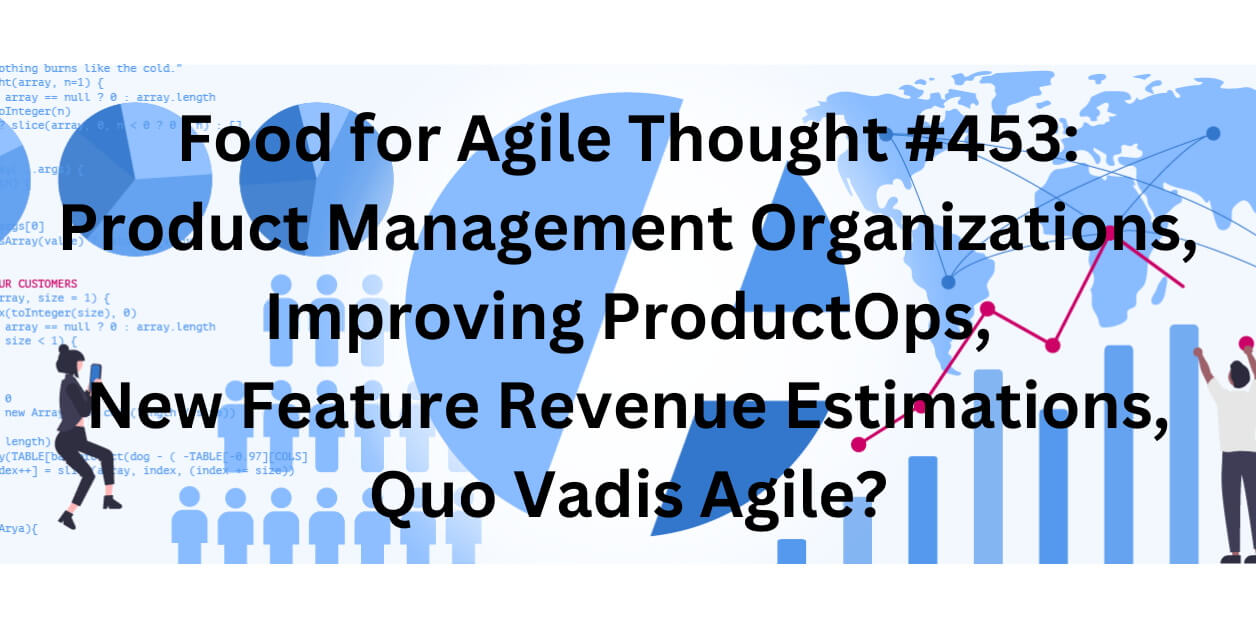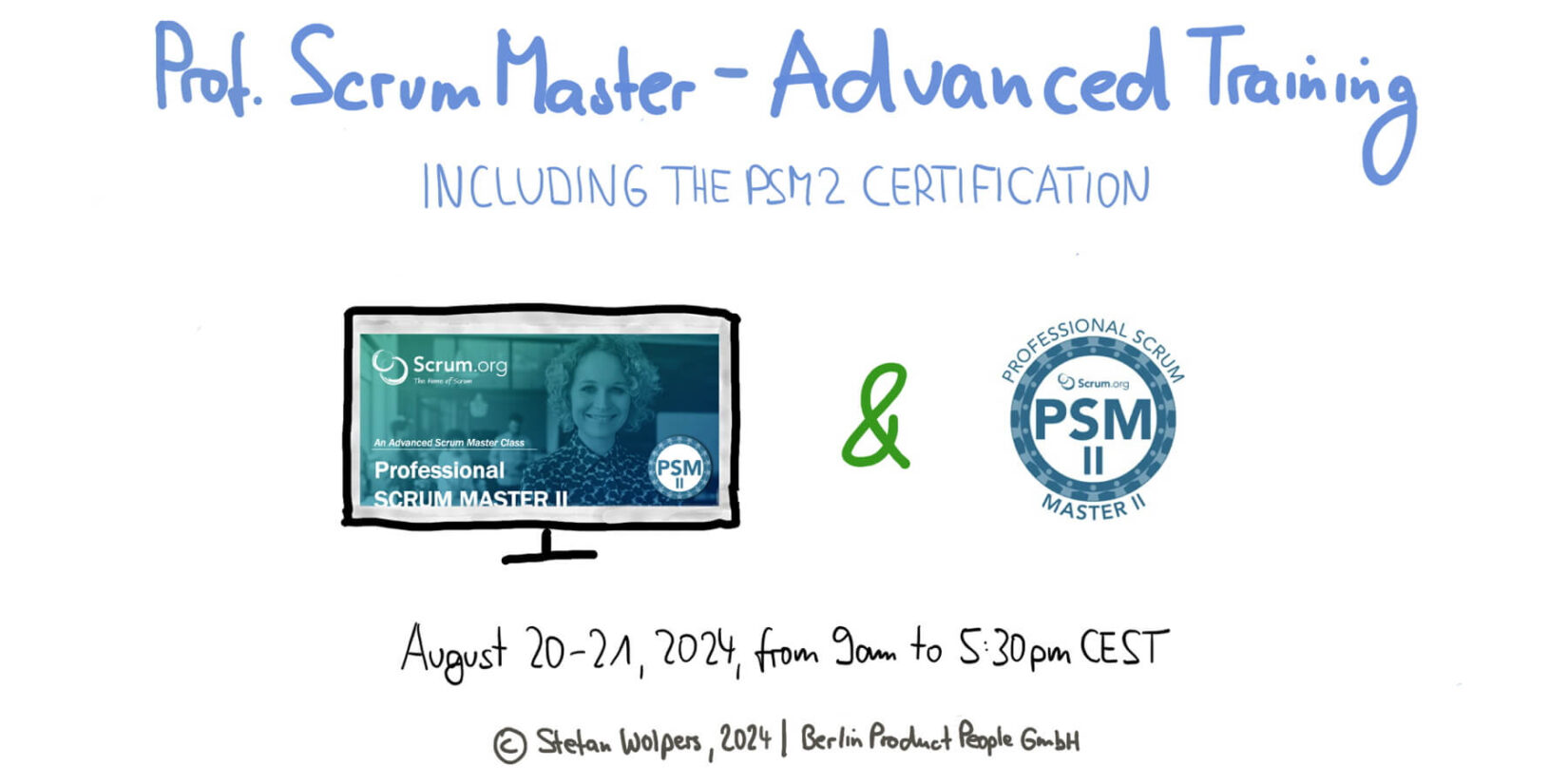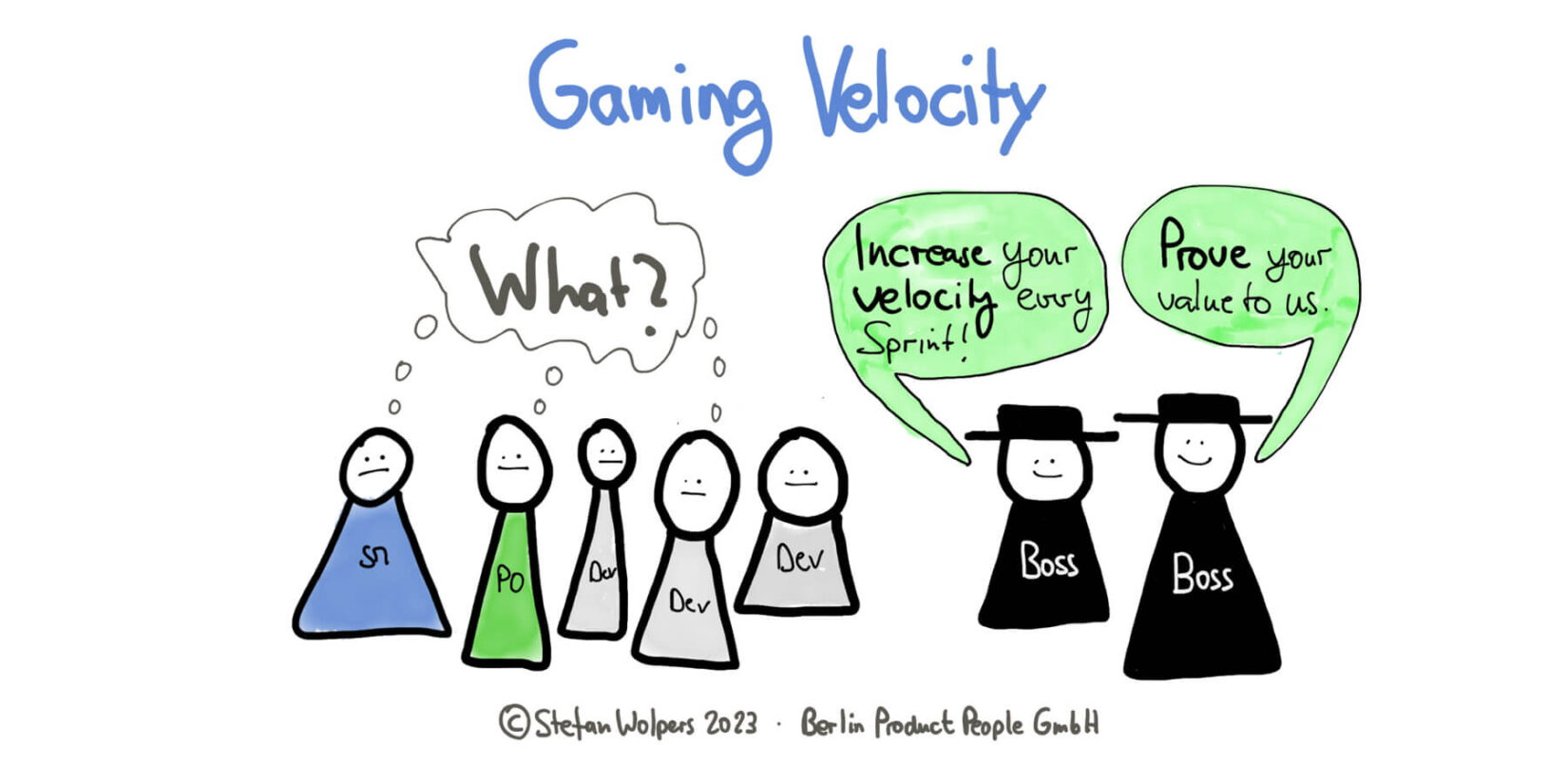TL; DR: Product Management Organizations — Food for Agile Thought #453
Welcome to the 453rd edition of the Food for Agile Thought newsletter, shared with 42,652 peers. This week, we feature insights from Melissa Perri, who provides a framework for robust product management organizations focusing on alignment, efficiency, and continuous improvement. Stefan Lindegaard warns about Organizational Debt Syndrome and the need for proactive leadership to maintain agility, and Jennifer Riggins reveals a study highlighting developers’ lost productivity due to management inefficiencies, stressing better communication. Also, Evan Leybourn discusses the future of Agile, shifting from anecdotes to data-driven insights. At the same time, Terry Danylak shares strategies to move from firefighting to proactive management, enhancing productivity and workplace health.
Then, Itamar Gilad critiques the “user-needs-first” approach, advocating for a flexible strategy that aligns ideas with company goals for high-impact products. John Cutler suggests that percentage allocations obscure priorities and advocates prioritizing based on value and urgency, and Jon Odo provides five tips for trimming Product Backlogs, emphasizing removing outdated and unclear items to boost team efficiency. Moreover, Zach Dunn highlights the pitfalls of overestimating revenue from sales feedback and offers strategies to avoid these mistakes when prioritizing features.
Lastly, Johanna Rothman advocates for continual planning over quarterly planning to help agile teams adapt and deliver maximum value. Jenny Wanger introduces a product operations tool using process maps to diagnose inefficiencies and improve workflows, and Chris Matts explains Karl Weick’s Sensemaking framework for better organizational dynamics and collaboration. Jurgen Appelo presents 32 key concepts from systems thinking and complexity theory, highlighting their importance in Lean and Agile approaches. Finally, Rory Sutherland discusses marketing and behavioral science with Lenny Rachitsky, focusing on the role of psychology, product success paradoxes, and the pitfalls of metrics-driven workplaces.

🎓 September 1, 2024: The Advanced Product Backlog Management Course for Just $99!

👉 Please note:
- The course includes membership in a new community of agile professionals.
- The course will only be available for sign-up until September 8, 2024!
Did you miss the previous Food for Agile Thought issue 452?
🗞 Shall I notify you about articles like this one? Awesome! You can sign up here for the ‘Food for Agile Thought’ newsletter and join 42,000-plus subscribers.
🎓 Join Stefan in one of his upcoming Professional Scrum training classes!
🏆 The Tip of the Week
: Building a Great Product Management Organization
Melissa Perri shares a comprehensive framework for building robust product management organizations. The framework focuses on organizational design, strategy, operations, and culture to ensure alignment, efficiency, continuous improvement, and high-value products to customers and stakeholders.
🍋 Lemon of the Week
(via Medium): Killing the iPod (and Scrum).
Prateek Singh claims Agile needs to ditch Scrum, likening it to Apple discontinuing the iPod. He suggests that true agility means abandoning the tried-and-true, ignoring that Scrum’s foundational principles remain relevant even amidst modern advancements. There is no iPhone equivalent in “Agile.”
➿ Agile & Scrum
: Organizational Debt Syndrome Poses a Threat
Stefan Lindegaard highlights the dangers of Organizational Debt Syndrome, emphasizing the need for proactive leadership to identify and address accumulated shortcuts in culture and practices to maintain agility and competitiveness, not to mention the people.
(via The New Stack): Why Do Developers Lose 1 Day a Week to Inefficiencies?
Jennifer Riggins discusses a study revealing that developers lose one day a week to inefficiencies due to management’s lack of understanding, highlighting the need for better communication and targeted improvements to boost productivity and satisfaction.
(via Agile Uprising): 🎙 Where is Agile going with Evan Leybourn, Business Agility Institute
Evan Leybourn from the Business Agility Institute discusses the future of Agile, sharing insights on industry trends and potential directions, moving from anecdotal evidence to more concrete data.
: How To Stop Constantly Fighting Fires At Work
Terry Danylak offers strategies for transitioning from constant firefighting to proactive management by implementing strategic systems, tactical tools, and cultural conventions. This will ultimately enhance productivity and foster a healthier work environment.
🎓 🖥 🇬🇧 Advanced Professional Scrum Master Training w/ PSM II Certificate — August 20-21, 2024
Discover Scrum’s four success principles in this official Scrum.org Advanced Scrum Master training class including the industry-recognized PSM II certification. The PSM II training class is designed as a live virtual class and will be offered in English.
Enjoy the benefits of a live virtual immersive class with like-minded agile peers from 09:00 – 17:30 CEST.

Learn more: 🖥 🇬🇧 Advanced Professional Scrum Master Training w/ PSM II Certificate — August 20-21, 2024.
Customer Voice: “Dear Stefan, Thanks a lot for two intense and mindblowing days. Your way of teaching suites me perfectly. I must admit that all the positive feedback you have gotten is spot on! I would any time a day recommand your class to a Scrum Master who wants to add a whole new level to his/her scrum game. To all of you reading this. You have to experience Stefans class to understand how good it is.” (Source.)
👉 From time to time, we can offer last-minute seats for training classes at cost to individuals who do not have access to a corporate training budget. If you would like to be notified about these opportunities, please register here.
🎯 Product
: You’re Not Just Solving User Problems
Itamar Gilad highlights the limitations of the “user-needs-first” approach, advocating for a more flexible product development strategy that prioritizes ideas against company goals to create high-impact products.
: How to Reconcile Prioritization and $/Time Allocation
John Cutler critiques using percentage allocations for strategy deployment, suggesting they obscure true priorities and expected outcomes. He advocates prioritizing based on value and urgency, treating allocations as hypotheses rather than strict guidelines.
: Honey, I Shrunk the Backlog
Jon Odo shares five tips for trimming your Product Backlog, emphasizing focus and clarity by removing outdated, non-immediate, and unclear items, ultimately enhancing team efficiency and product success.
(via Rally): Why product teams overestimate revenue from sales feedback
Zach Dunn warns product teams about overestimating revenue based on sales feedback, highlighting four common pitfalls when prioritizing features by business value, and offers strategies to avoid these mistakes.
📯 Gaming Velocity
Imagine your team’s line manager insists that a successful team improves velocity regularly. How could you, as a team, satisfy this strange, unsuitable demand without working more? How can you make gaming velocity a reality?
I run this exercise with my students of entry-level Scrum Master and Product Owner classes to help them reflect on the tricky nature of measuring success, metrics, and, of course, Goodhart’s Law: “When a measure becomes a target, it ceases to be a good measure.”
For the following article, I aggregated suggestions from more than 50 classes on how to “best” game velocity.

Learn more: Gaming Velocity.
🛠 Concepts, Tools & Measuring
: Think Big, Plan Small: How to Use Continual Planning
Johanna Rothman suggests replacing quarterly planning with continual planning, enabling agile teams to adapt to changes and deliver maximum value through small, frequent deliverables and rolling wave replanning.
: My all-in-one product operations process improvement tool"
Jenny Wanger introduces an all-in-one product operations tool that uses process maps to diagnose, visualize, and prototype changes. This tool helps teams identify inefficiencies, improve workflows, and gain buy-in for future improvements.
: Sensemaking and Nonsensemaking
Chris Matts explains Karl Weick’s Sensemaking framework, emphasizing its importance in understanding organizational dynamics and fostering shared meaning, which enhances collaboration and navigates change effectively.
: 32 Key Concepts in Systems Thinking and Complexity Theory
Jurgen Appelo offers a synthesized overview of 32 key concepts from systems thinking and complexity theory. It emphasizes their foundational role in modern organizational approaches like Lean and Agile, using AI to blend insights from various discourse sources.
🎶 Encore
and : What most people miss about marketing | Rory Sutherland (Vice Chairman of Ogilvy UK, author)
Rory Sutherland discusses marketing and behavioral science with Lenny Rachitsky, emphasizing psychology over logic, the paradox of product success, the value of fame and timing, and the pitfalls of metrics-driven workplaces.
📅 Scrum Training & Event Schedule
You can secure your seat for Scrum training classes, workshops, and meetups directly by following the corresponding link in the table below:
| Date | Class and Language | City | Price |
|---|---|---|---|
| 🖥 💯 🇬🇧 February 3, 2026 | Guaranteed: Hands-on Agile #71: A3 Framework — Assist, Automate, Avoid — Let’s Build a Playbook! (English; Live Virtual Meetup) | Meetup | FREE |
| 🖥 💯 🇩🇪 February 10-11, 2026 | Guaranteed: Professional Scrum Product Owner Training (PSPO I; German; Live Virtual Class) | Live Virtual Class | €1,299 incl. 19% VAT |
| 🖥 💯 🇬🇧 February 19, 2026 | Guaranteed: Hands-on Agile #72: Become Your Organization's AI Champion: A Crowdsourced Playbook (English; Live Virtual Meetup) | Meetup | FREE |
| 🖥 🇬🇧 March 10-11, 2026 | Professional Scrum Master—Advanced Training (PSM II; English; Live Virtual Class) | Live Virtual Class | €1,299 incl. 19% VAT |
| 🖥 💯 🇬🇧 March 19 to April 16, 2026 | Guaranteed: AI4Agile BootCamp #6 (English; Live Virtual Cohort) | Live Virtual Cohort | €499 incl. 19% VAT |
| 🖥 🇩🇪 March 24-25, 2026 | Professional Scrum Product Owner Training (PSPO I; German; Live Virtual Class) | Live Virtual Class | €1,299 incl. 19% VAT |
See all upcoming classes here.

You can book your seat for the training directly by following the corresponding links to the ticket shop. If the procurement process of your organization requires a different purchasing process, please contact Berlin Product People GmbH directly.
📺 Join 6,000-plus Agile Peers on Youtube
Now available on the Age-of-Product Youtube channel to improve learning, for example, about the Product Manager Replacement:
- Hands-on Agile 62: From Backlog Manager to Product Manager with David Pereira.
- Hands-on Agile 61: Toyota Kata Coaching for Agile Teams & Transformations with Fortune Buchholtz.
- Hands-on Agile 59: Tackling Fake Agility with Johanna Rothman.
- Hands-on Agile 57: Humble Planning with Maarten Dalmijn.
- Hands-on Agile 53: An Agile Coaches Guide to Storytelling with Bob Galen.
- Hands-on Agile EXTRA: How Elon Musk Would Run YOUR Business with Joe Justice.

✋ Do Not Miss Out and Learn About Product Management Organizations — Join the 20,000-plus Strong ‘Hands-on Agile’ Slack Community
I invite you to join the “Hands-on Agile” Slack Community and enjoy the benefits of a fast-growing, vibrant community of agile practitioners from around the world.

If you like to join all you have to do now is provide your credentials via this Google form, and I will sign you up. By the way, it’s free.
Help your team to learn about Product Management Organizations by pointing them to the free Scrum Anti-Patterns Guide:

